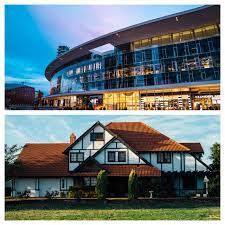The Benefits of Investing in Commercial Residential Property
When it comes to real estate investments, commercial residential properties offer a unique opportunity that combines the best of both worlds. These properties are a hybrid of commercial and residential spaces, offering investors a range of benefits that make them an attractive option. Let’s explore why investing in commercial residential property can be a smart move.
Diversification
Commercial residential properties provide investors with diversification opportunities. Unlike investing solely in residential or commercial properties, this type of investment allows you to spread your risk across different markets. By having both commercial and residential tenants, you can mitigate potential losses if one sector experiences a downturn.
Steady Income Stream
Renting out commercial spaces within a residential property can provide a stable and consistent income stream. Commercial leases tend to be longer than residential leases, which means you have the potential for longer-term tenants and predictable cash flow. Additionally, commercial leases often include annual rent increases, providing an opportunity for rental income growth over time.
Higher Rental Yields
Commercial rental rates are typically higher than residential rental rates on a per-square-foot basis. This means that by incorporating commercial spaces into your residential property, you have the potential to earn higher rental yields compared to traditional purely residential investments.
Flexibility
Commercial spaces within a residential property offer flexibility for investors. These spaces can be used for various purposes such as offices, retail shops, or restaurants depending on local zoning regulations and market demand. This flexibility allows you to adapt to changing market conditions and maximize the value of your investment.
Potential Appreciation
In addition to generating rental income, commercial residential properties have the potential for appreciation over time. As the surrounding area develops and improves, the value of your property may increase. This can provide you with additional equity and potential capital gains if you decide to sell in the future.
Tax Benefits
Investing in commercial residential property can offer tax advantages. Expenses related to managing and maintaining the property, including repairs, renovations, and property management fees, may be tax-deductible. Additionally, depreciation deductions can help offset rental income for tax purposes.
Conclusion
Commercial residential properties provide investors with a unique opportunity to diversify their portfolios, generate steady income streams, and potentially earn higher rental yields. The flexibility of these properties allows investors to adapt to changing market conditions while also benefiting from potential appreciation and tax advantages. Consider exploring commercial residential property as a viable investment option that offers the best of both commercial and residential real estate.
“A Closer Look at Commercial Real Estate: Understanding Property Examples”
3. “Defining the Landscape: The Meanings of Commercial and Residential Property
- What are examples of commercial and residential?
- What is a commercial property example?
- What is the meaning of commercial and residential?
- What is the meaning of commercial premises?
What are examples of commercial and residential?
Commercial properties refer to spaces that are primarily used for business purposes. Examples of commercial properties include office buildings, retail stores, shopping malls, warehouses, and industrial complexes. These properties are typically leased or rented out to businesses or organizations that operate for profit. On the other hand, residential properties are designed for individuals or families to live in. They include single-family homes, apartments, condominiums, townhouses, and residential complexes. Residential properties are intended for personal use and provide a place for people to reside and create their own living spaces.
What is a commercial property example?
A commercial property refers to any real estate asset that is used for business or income-generating purposes. Examples of commercial properties include office buildings, retail stores, warehouses, industrial complexes, hotels, and apartment buildings with multiple units. These properties are typically leased or rented out to tenants who operate businesses or provide services. The primary purpose of a commercial property is to generate revenue through rental income or the sale of goods and services. Investing in commercial properties can offer potential long-term financial benefits and diversification opportunities for investors.
What is the meaning of commercial and residential?
Commercial and residential are terms used to classify different types of properties based on their intended use. Commercial properties are those that are primarily used for business purposes, such as office buildings, retail spaces, industrial warehouses, and hotels. These properties are typically leased or rented out to businesses or organizations for commercial activities. On the other hand, residential properties are designed and used primarily for housing purposes. They include single-family homes, apartments, condominiums, townhouses, and other dwellings where people live. Residential properties are usually occupied by individuals or families who either own or rent the space for residential purposes. Understanding the distinction between commercial and residential properties is essential when considering real estate investments or determining the suitable property type for your specific needs.
What is the meaning of commercial premises?
Commercial premises refer to any physical space or property that is specifically designated for commercial activities and business operations. These premises are intended for conducting commercial ventures such as offices, retail stores, restaurants, warehouses, or any other business-related activities. Unlike residential premises that are primarily used for living purposes, commercial premises are designed to facilitate economic transactions and cater to the needs of businesses. They often comply with specific zoning regulations and may have features like storefronts, signage, parking lots, and amenities tailored to support commercial activities.
Tags: annual rent increases, benefits, both worlds, commercial and residential tenants, commercial residential property, diversification, flexibility for investors, higher rental yields, hybrid, investing, longer-term tenants, per-square-foot basis, potential losses, predictable cash flow, real estate investments, renting out commercial spaces, residential or commercial properties, spread risk, stable and consistent income stream, steady income stream, unique opportunity
